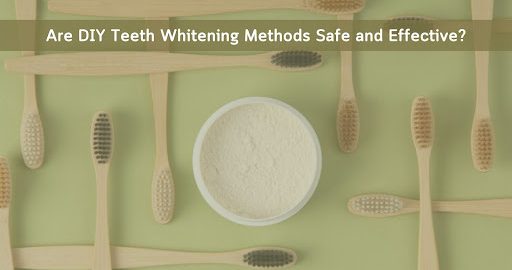
Are DIY Teeth Whitening Methods Safe and Effective?
Many would love to have sparkling and bright smiles across the globe today, and the quest for this perfect smile has led to immense popularity in today’s world regarding teeth whitening. Increasing interest in DIY methods of teeth whitening with at-home kits or natural remedies means their safety and effectiveness must be known.
This article will cover DIY teeth whitening. From the various offered methods, we’ll emphasize some distinct methods you can use to analyze the possible risks and benefits. Knowing your facts will guide you in making the right decision on which one to consider for your dazzling, healthy smile.
Understanding DIY Teeth Whitening Methods
It comprises some general variation in various forms such as whitening kits over-the-counter, whitening strips, charcoal toothpaste, baking soda, hydrogen peroxide, and many more homemade mixtures. Well, one needs to understand the safety and effectiveness of these methods, though they may seem easy and inexpensive.
The kit and strips for whitening mostly include a bleaching agent, either hydrogen peroxide or carbamide peroxide, which removes stains on the enamel of the tooth. But since products made for that purpose seem to be producing rather strong effects, some degree of care in purely obeying instructions related to application has to be taken, other than the danger from adverse side effects such as exaggerated sensitivity of the teeth or irritation of gums. Concentrations in such a product will probably be lower than for more professional treatments and the effects might not be as dramatic when the patient leaves the dentist.
Charcoal toothpaste, which claims its strength to be capable of eradicating stains and toxin in your teeth, has become so popular lately. However, little scientific evidence backs up this claim, and it is also potentially too abrasive to use daily and can cause erosive effects on the enamel of the enamel and tooth sensitivity.
This is perhaps the most common household product, baking soda, which is usually normally thought to be a whitener of the teeth. Indeed it would work to remove surface stains but long-term or harsh use can cause damage to the enamel. Hydrogen peroxide, when used moderately and after proper dilution, will once more have its whitening effects. Its excessive use, however, is sure to be dangerous to your gums and oral tissues.
Perhaps the most pressing fear about DIY teeth-whitening products is the potential for misuse or abuse of the product. When applied insufficiently or too frequently, these can easily damage the enamel, result in heightened sensitivity to the teeth, inflamed gums, and in some cases, even gum recession. The abrasive nature of many of the DIY products has a tendency to cause enamel degradation, and in the future, the teeth will be more vulnerable to stains and decay.
This being the case, it is essential to note that not all discolorations of the teeth can be corrected by self-help measures. Intrinsic stains lie below the enamel and originate from various causes, which range from a medication taken to involvement of the tooth in trauma. Most probably, all extrinsic stains and most intrinsic stains will require dental bonding or veneers to remove them.
Why Do You Need Professional Support?
Though any whitening attempt from DIY methods might lead to some modest results, it would be proper sense to first see a dental professional before starting whitening activity. A dentist would be in a position to evaluate the oral health of an individual, assess the reason behind the white discoloration of teeth, and then suggest accordingly what would work best according to that condition.
Now, a dental office is one place where professional whitening of teeth can be done, and here are several advantages over that of doing the procedure without professional help. Dentists use more concentrated bleaching agents as well as have the ability to treat your mouth according to whatever your specific needs might be, which also determines the best way to minimize the risk of side effects. This means that you can have the ability of averting dental issues like tooth decay and gum disease before actually doing the whitening, which will always be a priority for dental professionals.
Conclusion
The DIY whitening promises whiter smiles at relatively lower costs but the possible risks against the possible benefits have to be weighed before trying out the remedies. While others may not show significant results, they can still pose risks associated with enamel damage, tooth sensitivity, and gum irritation in others.
For this reason, consulting a dental professional would be important to understand the root cause of the discoloration and appropriate whitening treatment. The process is conducted by dental experts that can offer superior results compared to those given by other sources while securing the safety of your oral health.
Remember, a healthy and radiant smile goes way beyond the surface. You could be at your best-with your teeth, healthy for years ahead with integrity.
Leave a Reply
Leave a Reply
Explore More Similar Posts
Explore More Blogs


Leave a Reply